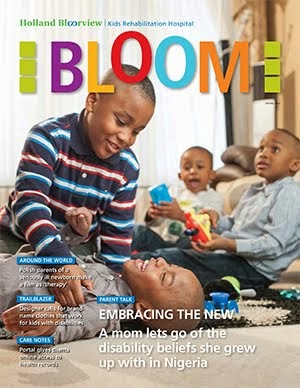Canadian playwright and director Judith Thompson is casting for a play that weaves together intimate stories from the lives of actors with Down syndrome.
It’s likely Thompson’s is the first play to give voice to this marginalized group: studies show that over 90 per cent of people given a prenatal diagnosis of Down syndrome opt to terminate.
The play – to run at Toronto’s 2012 Fringe Festival in July – will be a montage of monologues that explores what it means to have an extra 21st chromosome.
It will be modelled on two of Thompson’s earlier pieces – documentary dramas Body and Soul and The Grace Project: Sick. The former saw women share stories of life after age 45 in the form of a letter written to their bodies, while the latter gave voice to the experience of youth living with chronic illness or disability – people often stigmatized as being ‘sick.’
I interviewed Madeleine Greey, the writer producing Thompson’s new play, and mother to Krystal Nausbaum (photo above), an actress with Down syndrome who performed in The Grace Project: Sick and hopes to be part of Thompson’s new cast.
BLOOM: How would you describe the new play?
Madeleine Greey: It’ll be a series of monologues woven together about what it feels like to have Down syndrome. The play currently has no script and Judith has a way of coaching stories from people, then spinning her magic and writing and directing them into a cohesive form. This will not be a romanticized version of Down syndrome. We’re not getting anyone else’s interpretation of it. We’re going right to the source – people with Down syndrome. We want to face it head on. What does it feel like to have Down syndrome? What are the high points, what are the low points, what is it really like? Judith is not afraid of the difficult stuff and she’s interested in digging deep to find the joy and pain of every person’s experience.
BLOOM: Who can audition for the play?
Madeleine Greey: We’re looking for people with Down syndrome from teens to senior citizens. Verbal skills and previous acting experience aren’t prerequisites. Judith is well aware that lots of people with Down syndrome may be challenged in terms of verbalizing their story but she’s interested in having them express it in different ways – through dance, song, maybe even visual arts.
BLOOM: How demanding is the rehearsal schedule?
Madeleine Greey: We need people who can make what is a huge time commitment. In May and June we’ll be rehearsing Thursdays, Fridays and Saturdays from 11 a.m. to 5 p.m.
BLOOM: Why did you decide to produce the play?
Madeleine Greey: To be blunt, I’m always looking for opportunities for my daughter, that’s number one, and then secondly, my big motivation is to work with a person who is so creatively renowned. I have great trust in her. And thirdly, I believe that this play, which currently has no script, is going to reveal to audiences in Toronto what it means on all different levels to have Down syndrome. This is a group that doesn’t often have an opportunity to express itself.
BLOOM: What impact do you hope the play will have?
Madeleine Greey: I hope people walk out of this play saying ‘Wow, I had no idea.’ That’s my biggest hope. I feel you can go into theatre like this and meet people that you never would have encountered in your life, learn the most intimate things about them and be so deeply enriched by it.
Auditions for the play will be held Feb. 4 and 5 at Fringe Creation Lab at 720 Bathurst Street, 4th floor. Call Madeleine at 416-469-0852 or mado@madeleinegreey.com to reserve your spot. The audition will be like a group discussion where participants tell their stories.

























3 comments:
Sounds fantastic. I wish I could see it -- so keep those of us who can't posted!
Louise,
This is wonderful news! Although writing will forever be my first love, as it the only thing I do well, I am no less passionate about acting and film editing --I am the only guy I know who will watch a play or movie, two or three times, for the purpose of analyzing its every detail. Despite not having any formal training, I know when a piece is lacking substance, or not conveying the right message, lacking the precise degree of emotion needed to move or touch your audience at a particular moment --what can I say, "I just know."
So, are we taking Ben to the theatre?
love
matt
I'm delighted to see that there are others trying to bring awareness to this population, and that there are others out there making theatre accessible for all! Way to go!
Danielle Strnad
Artistic Director, DramaWay
Post a Comment